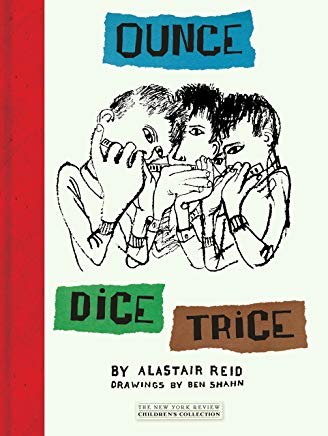The Blog
Blog Entry
A Tumbletell of Church Bells

A dog doesn’t say WOOF, when you think about it, and a cat doesn’t say MEOW, but how about MRAAOWL? More importantly, what is the sound of a shoelace breaking?
PLOO, suggests Alastair Reid in his knockabout Ounce Dice Trice, though perhaps it’s the notion of a shoelace making any noise at all – PIP is how I imagine it – that is the euphoric and even disorienting influence of reading this book a couple times through: I’m sure I’ve never used the word knockabout before now, but what the firkydoodle fudge.
“Words have a sound and shape, in addition to their meanings,” is how Reid introduces this book, for anyone not persuaded by the title. “Sometimes the sound IS the meaning. If you take a word like BALLOON and say it aloud seven or eight times, you will grow quite dizzy with it. All the words here are meant to be said aloud, over and over, for your own delight. If you want to know more about their meaning, ask a dictionary.”
Indeed. Or Google, he might have added with the back of his hand. I did look up some of the oddities here – TINGLE-AIREY, PIDDOCKS, BREASTSUMMER, MUMRUFFIN, JIGGERY-POKERY – some were documented, some weren’t, and some you were nonetheless rooting for. Since Google doesn’t know everything, right? What kind of language are we living in where there isn’t a word for the drop that clings stubbornly to the ends of certain people’s noses (POOSE?), or the smallest pig in a litter (TANTONY?), or the guy who is always stopping in the street and staring at curiosities? (GONGOOZLER? Me.)
Oh, don’t fret: this probably isn’t going to get anyone in very much trouble at school – even if they did call someone a FLIBBERTIGIBBET or CLOAF or SLAMMERKIN, the worst it would possibly earn is dopey disbelief. I was recently walking to soccer practice with a bunch of ten-year-olds who gleefully insisted on referring to their assistant principal as a male stripper. (She’s a she.) Really, think of the rhetorical nuggets we are in the habit of casting with zero regard for their veracity. So I’m not sure I care very much whether it’s properly a SKEIN of geese, or a SKULK of foxes or a SNUTTERING of monkeys or a CONSTERNATION of mothers – every one of these expressions seems well worth the risk of a misunderstanding.
And who knows? Maybe someone will pass these along. Or a WORG, which is a plant that never grows, or MIM people “who always sit with their fingertips together and their lips pursed tight, who always do the right thing, who disapprove,” and who we hope are not teaching our children. MIM people have WORGS in their gardens, gathering GNURR, and what is GNURR? Say it seven or eight times, and you might even sneeze.

